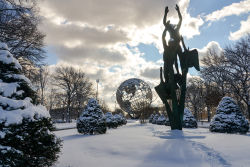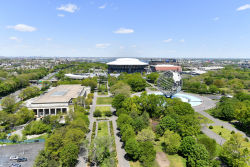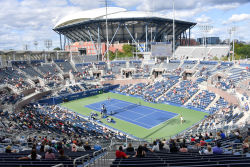Flushing Meadows Corona Park
Willow Lake Park - Invasive Phragmites
As one of the 20 most invasive plants in New York State, phragmites (Phragmites australis), also known as the common reed or “phrag,” have become a ubiquitous part of New York City’s landscape. Clusters of phragmites can be found fringing the ponds and marshes of many city parks such as this one. Great Kills Park in Staten Island, Idlewild Park and Alley Pond Park in Queens, Van Cortlandt Park in the Bronx, and Marine Park in Brooklyn have large concentrations of phrag. The plants are capable of living anywhere that stagnant or slow moving fresh water is found, including vacant lots, ditches, and along roadways, as well as in marshes and wetlands. Phragmites will take over any area where the soil has been disturbed. This aggressive reed outcompetes any pre-existing vegetation, leading to thick, choking stands that can grow to 15 feet in height. The name phragmites comes from phragma, Greek for ‘fence’ or ‘barrier.’ Phragmites grows so vigorously that it even reaches through paved streets.
Phragmites are considered to be a “cosmopolitan” species – one that grows throughout the world – but in recent years it has become particularly invasive, taking over other species’ habitats. It is not clear why phragmites suddenly began spreading so rapidly. Some ecologists believe that a new strain, genetically different from the native American species, was recently introduced from Europe. Anthropogenic, or human-caused, changes to soils also may have promoted phragmites growth. Increased nutrients and pollutants from fertilizers, sewage discharge, and urban stormwater runoff give phragmites a competitive advantage over other plants. Whatever the reason for phragmites’ spread, the population of the reed in the Northeast has skyrocketed in recent years, to the detriment of other plant and animal species.
Young phragmites is good for livestock feed, but local wildlife does not generally consume it. Occasionally, waterfowl may eat its seeds, muskrats its stems and rhizomes; but overall, phragmites provides poorer nutrition than the plant species it replaces. Although the thick strands provide good thermal cover for molting waterfowl, most birds do not nest where there is an abundance of phragmites, leading to dwindling bird populations. Phragmites adjacent to a salt marsh usually grows above the daily tides, limiting their use as a fish habitat to the rare spring tide that brings them to high elevations. In coastal areas, introducing tidal flow and planting salt marsh cordgrass (Spartina alterniflora), which is very salt-tolerant, can restrict phragmites growth. Other control efforts include herbicide use, which is effective but also leads to eradication of non-target species; cutting, which induces the same problem; and summer burning, which can actually encourage stronger growth by adding nutrients to the soil.
The invasive tendencies of phragmites are not completely negative. Thanks to their aggressive growth patterns, phragmites is able to remove enormous quantities of contaminants from degraded soils and wetlands. In England, where the plant is used to make thatched roofs, mats, and other weavings, phragmites is endangered, and ecologists there are exploring restoration methods.
Check out your park's Vital Signs
Clean & Safe
Green & Resilient
Empowered & Engaged Users
Share your feedback or learn more about how this park is part of a
Vital Park System

Know Before You Go
Due to construction on the Tide Gate Bridge, located on Meridian Road within Flushing Meadows Corona Park, vehicular traffic will not be allowed to cross the bridge in either direction. Please follow posted detour signs around Meridian Road and plan for additional travel time. Pedestrian traffic will still be permitted to cross the bridge.
Due to construction on the Tide Gate Bridge, located on Meridian Road within Flushing Meadows Corona Park, vehicular traffic will not be allowed to cross the bridge in either direction. Please follow posted detour signs around Meridian Road and plan for additional travel time. Pedestrian traffic will still be permitted to cross the bridge.

Downloads
- New York State Pavilion Listening Session
- Strategic Framework Plan: Introduction
- Strategic Framework Plan: Site Analysis
- Strategic Framework Plan: Conceptual Framework, Part I
- Strategic Framework Plan: Conceptual Framework, Part II
- Strategic Framework Plan: Vision and Goals, Part I
- Strategic Framework Plan: Vision and Goals, Part II
- Strategic Framework Plan: Appendix, Part I
- Strategic Framework Plan: Appendix, Part II
Links
- National Tennis Center Strategic Vision Project
- World Ice Arena
- Citi Field
- Mets Ticketing
- USTA National Tennis Center
- US Open
- Terrace on the Park Catering Hall
- New York Hall of Science
- Queens Museum
- Queens Botanical Garden
- Queens Theatre
- Queens Wildlife Conservation Center
- Fantasy Forest at the Flushing Meadows Carousel
- Wheel Fun Rentals
- Alliance for Flushing Meadows Corona Park
Contacts
General Park Info: (718) 760-6565
Pitch N Putt Golf and Miniature Golf : (718) 271-8182
World's Fair Marina on Flushing Bay : (718) 478-0480
World's Fair Marina Restaurant: (718) 898-1200
Terrace on the Park: (718) 592-5000
Citi Field: (718) 699-4220
Mets Ticketing: (718) 507-TIXX
USTA National Tennis Center: (718) 760-6200
US Open/USTA: (914) 696-7000
New York Hall of Science: (718) 699-0005
Queens Museum: (718) 592-9700
Queens Botanical Garden: (718) 886-3800
Queens Theatre: (718) 760-0064
Queens Wildlife Conservation Center: (718) 271-1500
Sports Permits: (718) 393-7272
Picnic/Barbeque Permit for Large Groups: (718) 393-7272
Wheel Fun Rentals: (917) 231-5519
World Ice Arena: (718) 760-9001
Al Oerter Recreation Center: (718) 353-7853
Flushing Meadows Corona Park Pool & Rink: (718) 271-7572
Special Events Permits: (718) 760-6560
Tennis Permits: (718) 393-7276
Volunteer Coordinator: (718) 760-6561










